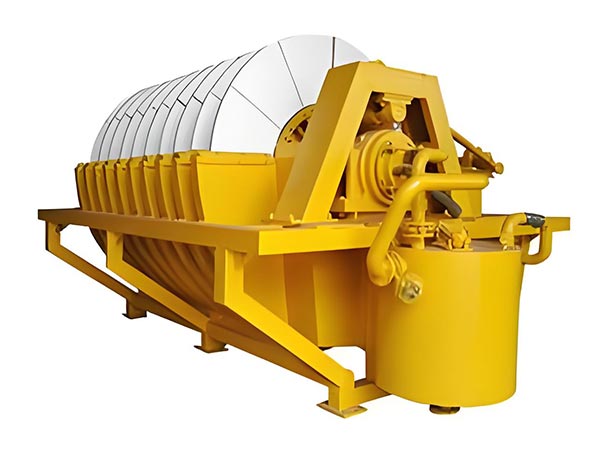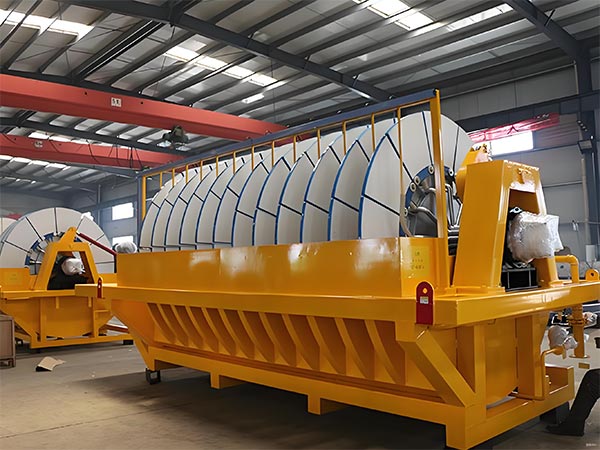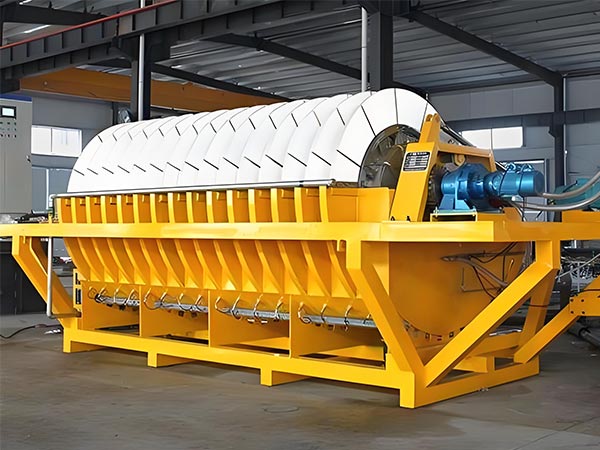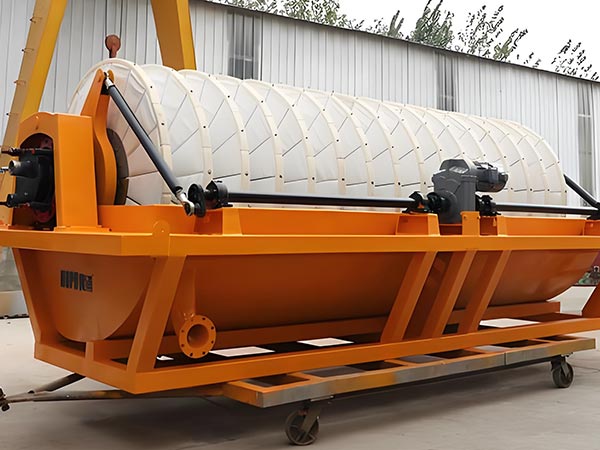Ceramic Disc Filter
In industrial production, the filtration process is of great importance. Ceramic disk filters, with their special materials and exquisite design, have become indispensable solid-liquid separation equipment in industrial processes. Whether in industries such as mining, chemical engineering, food processing, pharmaceutical manufacturing, or sewage treatment, where strict requirements are imposed on high-purity raw materials, ceramic disc filters, by virtue of their efficient solid-liquid separation capability, provide a guarantee for the continuous and stable operation of various industries.
Given the such wide range of applications of ceramic disk filters, their service life is particularly crucial. The service life not only affects enterprises' equipment investment returns and production costs but also serves as an important basis for measuring their performance stability and applicability.

Service Life
Under ideal operating conditions—such as stable water quality, standardized operation, and proper maintenance—the ceramic disk filter produced by Yinuo Machinery can achieve a service life of 10 to 15 years. This figure is derived from extensive practical applications and laboratory simulation results. Naturally, there may be significant variations in service life among different brands and models. When selecting ceramic disc filters from well-known brands, strict controls are implemented over aspects like ceramic material selection and process precision, which effectively extends the product's service life.
Material Selection
The service life of a Ceramic disk filters is directly related to its material. Different ceramics vary in hardness, wear resistance, and chemical stability, which directly affects the durability of the equipment.
1.White Aluminum Oxide (White Corundum)
It is the material of choice for high-end filters, with an alumina purity of over 99% and a Mohs hardness of 9.0, delivering exceptional wear resistance. In high-wear operating conditions such as the mining industry, it can effectively resist the scouring of hard particles like quartz sand, significantly extending the service life [of the filter]. Meanwhile, white aluminum oxide boasts excellent chemical stability and resistance to acid and alkali corrosion, making it suitable for complex chemical environments.
2.Brown Aluminum Oxide (Brown Corundum)
It contains approximately 95% alumina and has a Mohs hardness of around 8.5. While its wear resistance is moderate, it offers high cost-effectiveness, making it widely used in general chemical industries and other fields with relatively low requirements.
3.Silicon Carbide
It performs well in harsh environments such as high temperatures and strong corrosion, featuring excellent hardness, thermal stability, and chemical resistance. Although it has higher costs and complex manufacturing processes, its service life in special industries like petrochemicals is far longer than that of ordinary ceramic materials.



Impact of Application Scenarios on Service Life
The actual service life of ceramic disc filters is closely related to operating conditions, and different application scenarios pose severe challenges to their performance.
1.High-Temperature Environments: The heat resistance limit of ceramic materials must be taken into account. When the temperature exceeds the tolerable range, filter discs are prone to thermal expansion, cracking, or even deformation—issues that severely affect service life.
2.High-Humidity Environments: Moisture and salt accelerate the aging and corrosion of ceramics, with this effect being more pronounced in coastal areas. Corrosion spots tend to form on the surface of filter discs, leading to a decline in filtration precision.
3.High-Corrosion Environments: For example, the strong acid and alkali media used in the chemical and electroplating industries place extremely high demands on the material of filter discs. Ordinary ceramics may fail within a few months; however, when corrosion-resistant materials such as white corundum or zirconia are used, or when special coatings are applied, the equipment can operate in harsh environments for many years. This significantly improves production efficiency and reduces maintenance costs.
Operating Specifications
Operating specifications are a key human factor influencing the service life of Ceramic disk filters. Standardized operation not only extends the equipment's service life but also prevents hidden damage caused by improper operation, which would otherwise accelerate performance degradation.
Before starting the equipment, it is necessary to check whether the filter disc installation, the condition of sealing components, and pipeline connections are in good condition. Promptly replacing worn sealing components prevents medium leakage and filter disc corrosion, extending the equipment's service life by 2 to 3 years. Additionally, reasonable control of flow rate and pressure is also crucial.
Maintenance
Standardized maintenance is an effective means to extend the service life of Ceramic vacuum disk filter, mainly including daily cleaning, regular inspections, and systematic maintenance.
1.Daily Maintenance: The focus is on keeping the equipment clean. After each filtration operation, dust and impurities on the outer casing should be cleaned promptly to prevent them from entering the interior of the equipment and causing wear.
2.Regular Inspections: The condition of the filter discs is evaluated by observing surface marks, measuring thickness changes, and other methods. If wear occurs, the discs must be repaired or replaced immediately.
3.Systematic Maintenance: In accordance with the requirements in the instruction manual, clean the filter discs regularly, replace sealing components, and inspect pipeline connections. It is recommended to perform a deep cleaning of the filter discs every 1–2 months, using a dedicated cleaning agent to restore their filtration capacity.
Summary
The service life of Ceramic vacuum disk filters is comprehensively influenced by multiple factors, including material quality, operating conditions, operation practices, and maintenance. High-quality materials serve as the foundation, suitable operating conditions facilitate smooth operation, standardized operation prevents damage, and regular maintenance is the key to extending service life.
Enterprises need to attach importance to the full-lifecycle management of ceramic disc filters, and exercise strict control over multiple links—from selection and operation to maintenance—to ensure the equipment remains in good condition at all times. This not only helps ensure continuous and stable production as well as low-cost operation but also provides solid support for enterprises to improve energy efficiency and enhance competitiveness.







